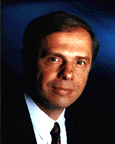Stuttgart, March 6, 1995
"According to today's calculations, traffic levels will continue to rise in tomorrow's conurbations, and freight traffic in particular is likely to show considerable rates of increase." This was the message of Prof. Dr. Hartmut Weule, member of the Daimler-Benz AG board responsible for Research and Technology, in his address to the "Baden-Württemberg Symposium" of the Academy for Technology Assessment, on March 6, 1995. The event took place in Haus Lämmerbuckel, the Daimler-Benz Further Education Center. Continuing, Weule emphasized that it was thus time to make the visions of long-term urban development a matter for public discussion.This conclusion was based on extensive studies carried out by an interdisciplinary group of researchers into city life in roughly 25 years' time. The researchers anticipate that even the most modern information and communication technologies, like the videophone and domestic work stations linked to data networks, will only be able to relieve the traffic in towns and cities to a very limited extent.
Eighty percent of all citizens of the European Community are already living in an urban environment. In the scenarios developed, neither a "town of planned urbanity" nor a "town in the process of self-adjustment" can dispense entirely with individual transport. Both scenarios entail the adoption of technical solutions in the areas of automotive engineering - such as small vehicles or technologies for reducing emissions - and the regulation of traffic by means of guidance systems, information systems, and billing systems. Both views proceed from a more conscious choice of transport. Nevertheless, the overall view suggests growth in traffic levels and assumes substantial rates of increase for freight traffic in particular.
For all the detail of the projections, such scenarios should not - and indeed are not intended to - predict the future. "The future just does not 'happen'; it is 'made' by people," Prof. Weule maintains. The design of the future is not the sole province of experts and committees: "In a democratic community all citizens are consulted, especially where visions are involved and the consequences they might entail." The imagined scenarios offer one opportunity of raising such questions. Prof. Weule has, therefore, demanded a public debate on the long-term perspectives of urban development. He said: "We should all of us ask ourselves how the areas we live in are likely to develop in the next 25 years, in what sort of town we want to be living and working in by the year 2020, and what should be done - and at what price - in order to achieve these objectives."

Back to the News archive







 Prof. Dr. Weule
Prof. Dr. Weule







